Eighteen years ago, a middle-aged couple from England were on holiday sitting on a bus in Mumbai. They had realised how naive they were when the taxi drivers over-charged them and took them on the longest route possible to their hotel. So determined not to be over-charged any longer, they jumped on a bus. Again, they realised that even this may have been beyond their skill levels as the bus didn’t seem to have a driver. A young woman got on the bus and asked us if we knew when the bus was due to leave. It became immediately clear that we had no idea about the bus, India and many other things! That young woman was Ekta Hattangady, who worked at Dream a Dream. Little did we know whilst we were all laughing on that hot stationary bus that it would lead to a long and wonderful journey and association. As we chatted, we talked about our work, Ekta told us about her work at Dream a Dream and some of the challenges of delivering programs to children who were severely disadvantaged. She mentioned that what they really needed were psychologists to help overcome these issues. Immediately our ears pricked up as we were two Consultant Clinical Psychologists, specialising in child development and adversity, and delivering mental health interventions.
So maybe this is the time to introduce ourselves – Fiona and Dave, at work we were Dr Kennedy and Dr Pearson, both managing systems, working clinically and researching in the National Health Service UK and at the University of Southampton, also in the UK. We decided to take early retirement and think about what we wanted to do with the rest of our lives using our clinical skills when we met Ekta.
The next year we came back again to India, this time to the small first floor Dream a Dream office in Adugodi and met Vishal, the Co-founder of Dream a Dream. He, along with five other people, were working hard to change the lives of severely disadvantaged children many of which were cared for in shelters. Vishal had a clear vision and skills in delivering programs mainly using volunteers. After discussions, we decided to form a ‘mini team’ to look at the way forward. Hosted by Dr. Shashi Rao, the Founder of Ananya Trust (a residential alternative school for disadvantaged kids), we spent many hours under the coconut trees there, talking about two projects – how to measure outcome of the work Dream a Dream does and how to set up their Mentoring Program.
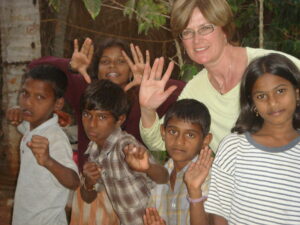
Before we could start, we had to understand what we were doing and more importantly why we were doing it. By fusing clinical and scientific skills with Vishal’s vital ‘this is how we do it’ skills we talked about severe adversity causing developmental, neurological and psychological damage – often know as ‘failure to thrive’. Dream a Dream’s programs worked against the devastating long-term damage that this causes. This is well documented in scientific, research and clinical literature, but the language and presentation for Dream a Dream were unhelpful. We had to convert these concepts into everyday conversation that was non-clinical and non-judgemental. And so, the Life Skills Assessment Scale (LSAS), the first observation tool for Measuring Life Skills of Disadvantaged Children in the Developing World and the Mentoring Program were born. For this to come to fruition our mini team of three with no facilities, no funding, had to match global research teams from major universities. This is how it went –
The LSAS measures life skills in young people aged between 8 and 22 years. It’s very simple to use and very accurate. If you’re scientifically minded – there are 5 simple observations that have been standardised on a disadvantaged child and young person population and has age norms. What this means is that the progress of any young person can be measured (and compared with peer group) along with whole program effectiveness. This allowed facilitators to know which programs had impact for individuals or groups of young people allowing them to be matched. It also indicated which were the most effective programs. Dream a Dream could now say that their programs were based on scientific evidence, scientifically assessed and shown to work – a first for NGOs in this sector in India. Interestingly, the LSAS could also indicate which young people needed more help, so no child was left out. The scale was published in a peer reviewed international journal in 2014 and has has been downloaded over 30,000 times and received 57 citations. Winning the Global Innovation Award in Helsinki, the tool is in wide use in India, together with many low-and-middle-income countries. Over 12 organizations in India and 4 globally (in Thailand, Cambodia, Kenya, Colombia) have been trained to use the LSAS in various interventions.
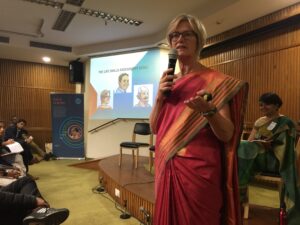
As the LSAS was being developed, the Mentoring Program was also in the pipeline. Using cutting edge evidence and with an understanding of child development-based techniques, volunteers were trained to develop a relationship with young people to realistically meet their needs. The training started with an understanding of child development and the effects of adversity. It then continued to practice interventions that had real impact in the world. All of this was wrapped up into good fun sessions with all technical, scientific language converted to every-day conversation. A whole family of mentors started work to empower young lives.
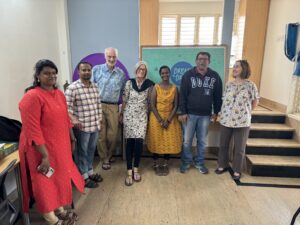
As the organisation moved forward, Suchetha took over as the CEO, staff numbers grew, and new priorities developed. Dream a Dream is now a leading NGO influencing education as a whole concept. There is a full-time research team led by Dr. Sreehari Ravindranath and a partnership with the University of Southampton UK has been formed. Again, Dream a Dream is leading the NGO system in India influencing education and in research and innovation; changing the lives of millions of young people.
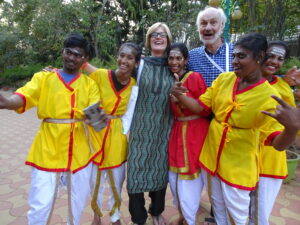
In 2007, we would have never imagined that a visit to Dream a Dream will lead to an association that has lasted 17+ years. It has been a privilege to have witnessed the evolution of Deam a Dream from a small organization with bold plans to a large organization with even more ambitious goals. We are sure that under Suchetha’s leadership the evolution will continue. The need is great, and the challenge is to continually work out how best to have maximum impact in a huge, changing society as priorities change to meet the needs of politics and funders. For our part, we would like to thank Dream a Dream and all the wonderful people we’ve met for allowing us to be a part of the experience.
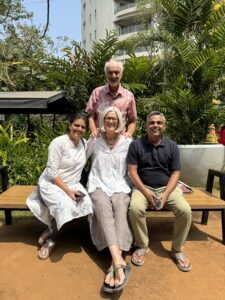
About the Authors:
Dr David Pearson and Dr Fiona Kennedy are both Consultant Clinical Psychologists with more than 30 years’ experience in the UK Health Services. They have worked pro bono for Dream a Dream for more than 17 years. You can read more about their work here.
They have co-authored two books and co-edited one, including the award winning ‘Get Your Life Back: The Most Effective Therapies for a Better You’ that helps young people and adults overcome mental health problems.
Fiona and Dave are affiliated with Southampton University UK and have published research on effects of trauma as well as publishing their research in partnership with Dream A Dream.
They present at nationally and international conferences and deliver training to therapists, psychologists and psychiatrists. Dr Fiona Kennedy is Director of GreenWood Mentors Ltd.


